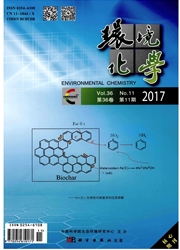

 中文摘要:
中文摘要:
黑碳是含碳物质不充分燃烧而产生的一种高度芳香化结构无定型碳质,是沉积物有机质中重要的组成部分.黑碳通过表面吸附或微孔束缚作用将疏水性有机污染物(HOCs)锁定在沉积物中,其超强的吸附性能导致对HOCs的解吸量减少、解吸速率减慢,进而在短期内降低其生物有效性和短期生物毒性,大量学者开展了较低HOCs浓度下短期降解实验,得出了黑碳抑制HOCs降解的结论.但长期来看,黑碳一方面会通过抑制生物有效性削弱微生物降解等HOCs的自然衰减速率,另一方面也会通过促进微生物生长提高降解率.因此推测,黑碳对HOCs微生物降解的影响可能与HOCs的类型与浓度相关,在较高HOCs浓度下,黑碳可能会通过降低急性毒性,促进微生物生长和生物膜形成来加速HOCs的降解.本文综述了黑碳对HOCs吸附/解吸和微生物降解的研究进展,从黑碳对HOCs的吸附机理和吸附模型,对解吸动力学、微生物生长以及生物有效性影响等方面进行讨论,指出了黑碳对环境中HOCs迁移转化与归趋的影响,并对黑碳的应用前景及研究趋势进行了展望.
 英文摘要:
英文摘要:
Black carbon (BC), a ubiquitous subdomain of organic carbon matter in sediments, which is generated from incomplete combustion of biomass and fossil fuels, is considered to be a promising novel material for controlling hydrophobic organic contaminants (HOCs) due to its intrinsically high surface activity. The strong sorption of BC to HOCs reduces the desorption amount and slows down the desorption rate of HOCs, and consequently decreases the bioavailability and toxicity in short -term. Many previous experiments were conducted on short-term degradation under low HOCs concentration, and the results demonstrated that BC suppressed the degradation of HOCs. But in long-term, on one hand, the addition of BC might weaken the natural attenuation rate by means such as microbial degradation through decreasing the bioavailability of HOCs. On the other hand, BC could increase the microbial degradation of HOCs by promoting the growth of microbe. Consequently, we speculate that effect of BC on biodegradation maybe relate to concentration and property of HOCs. BC will enhance the microbial degradation of HOCs by lowering the acute toxicity of HOCs as well as promoting the growth of microbe and biological membrane, when the BC, effect of BC on the desorption and bioavailability, as well as on biodegradation and effect of BC on the migration and fate of HOCs in the environment. An outlook of future research directions and applications of BC in environment was also provided.
 同期刊论文项目
同期刊论文项目
 同项目期刊论文
同项目期刊论文
 期刊信息
期刊信息
